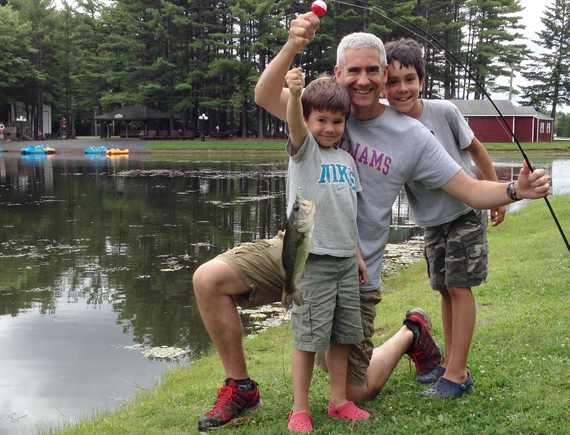As Labor Day approached a couple weeks ago, I took my two boys fishing. There was no blackboard or chalk at the lake; no textbooks or worksheets; no official science lab kits; and no tests. And although we weren't in a formal classroom, nature turned out to be a pretty powerful teacher. My kids didn't realize it at the time, but there was a lot of learning going on. They gained science knowledge (ecosystems, predator and prey, water quality, and species identification). They practiced reading (prior to our adventure, we read a children's mystery in which the main characters went fishing). We practiced writing (the boys sent an email to their grandparents to share our fish photos). And they applied their math skills (a ruler revealed that a bass we caught was 12.5" long).
This week, as my kids head back to school, I hope their learning can continue at such a steep rate. Don't get me wrong - I'm not commenting on our nation's education system. I'm simply highlighting two facts: 1) School-aged children spend a lot more time outside of classrooms than in them; and 2) Time spent outside of classrooms plays a vital role in teaching our kids.
The first point is simple arithmatic. During the school year, my kids' weekly schedule looks like this:
•70 Hours - Sleeping*
•67 Hours - Awake and not at school
•26 Hours - At school receiving formal instruction
•5 Hours - At school recess, lunch, and transitioning between activities
*Sure, let's humor ourselves and assume my kids actually get their recommended 10 hours of sleep each night).
From this math, it's easy to see that kids spend 72 hours a week, or 2.8x more waking hours outside a classroom than in one. The good news is that kids are also learning a lot when they are outside of school.
In a National Resources Council study sponsored by the National Science Foundation, Dr. Phil Bell found that activites such as visiting museums, pursuing personal hobbies, and taking a walk in the park play a critical role in enriching people's knowledge and interest in science. Bell asserts that "these experiences can kick-start and sustain long-term interests that involve sophisticated learning." He also found that these experiences significantly improve science learning outcomes for individuals who are historically underrepresented in science, such as women and minorities. Another article published in American Scientist goes further, suggesting that the majority of science learning occurs outside the classroom.
We know that schools play an important role in educating our children. Schools provide us with master teachers, and shared resources such as expensive high-tech physics equipment. Schools also allow kids to learn socialization and to compete at times, which is motivational to some learners. But teachers can't do it alone when they only work with our children for a small portion of the week. This summer was a good reminder for me that there are many rich learning opportunities in the world around us. I hope my family will continue to access these opportunities as my kids head back to school.
